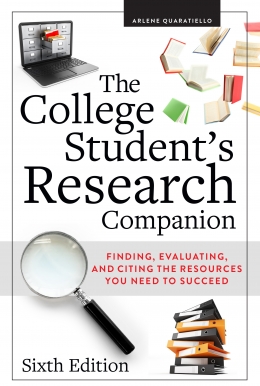
Primary tabs
You don't need to be an ALA Member to purchase from the ALA Store, but you'll be asked to create an online account/profile during the checkout to proceed. This Web Account is for both Members and non-Members.
If you are Tax-Exempt, please verify that your account is currently set up as exempt before placing your order, as our new fulfillment center will need current documentation. Learn how to verify here.
- Description
- Table of Contents
- About the author
- Reviews
The newest edition of this valuable tool offers students easy-to-understand guidance on going beyond Google to find, evaluate, and use quality informational sources that will enable them to write better research papers.
Most college students are novice researchers for whom Google is the option of first resort. But the information provided by the surface websites usually found this way often lacks substance and is of questionable authority. You can save your students from fruitless, random web searching with the help of this cutting-edge guide, newly updated to reflect the broad range of today’s information sources. It’s a must-have tool for first-year composition and information literacy courses, LIS collections, and graduate-level research. With this trusted resource by their side, students will
- master the skills needed to integrate quality informational sources into their writing, enabling them to craft better essays;
- receive guidance on topic selection, time management, and research planning;
- learn a five-step process for evaluating sources;
- be introduced to the fundamentals of database searching, using reference sources, and finding periodical articles, books, and websites;
- get pointers on using sources properly, with advice on citing them according to widely used documentation styles, avoiding plagiarism, quoting or paraphrasing correctly, and incorporating notes; and
- find review questions and exercises at the end of each chapter, reinforcing the concepts they have just learned.
Examination copies are available for instructors who are interested in adopting this title for course use.
Preface
Chapter 1: Preliminary Steps
Selecting Your Topic
Planning Your Research
Review Questions
Chapter 2: Evaluating Informational Sources
Evaluating Content: What Information Does the Source Provide?
Evaluating Authority: Who Wrote the Source?
Evaluating Dates: When Was the Source Written?
Evaluating Purpose: Why Was the Source Written?
Evaluating Quality: How Is It Written?
Review Questions
Chapter 3: Fundamentals of Database Searching
Types of Databases
Searching Databases
Review Questions
Chapter 4: Finding Periodical Articles
Types of Periodicals
Choosing Which Periodical Database to Use
Periodical Database Records
Searching Periodical Databases
Accessing the Full Text
Review Questions
Chapter 5: Finding Books
Searching the Online Catalog
Understanding the Classification Systems
E-books
Review Questions
Chapter 6: Finding Websites
The Structure of the Internet
The Content of the Internet
Using Search Engines
Evaluating Websites
Review Questions
Chapter 7: Using Reference Sources
Encyclopedias
Dictionaries
Supporting Information
Review Questions
Chapter 8: Using the Sources You Have Found
Quoting
Paraphrasing
Summarizing
Avoiding Plagiarism
Documentation
Review Questions
Conclusion
Appendixes
- Appendix A: Answers to Review Questions
- Appendix B: “Award-Winning” Databases
- Appendix C: Classification Systems
- Appendix D: Citation Style Guide
Index
Arlene Quaratiello
Arlene Quaratiello was the Coordinator of Library Instruction at Emerson College before she began her career as a college English instructor. For many years she taught writing courses at St. Anselm College in Manchester, NH and several other schools in the Boston area. She has written numerous essays for biographical encyclopedias as well as Rachel Carson: A Biography, a volume in the Greenwood Press Biography series.
"Offers college students invaluable guidance on approaching the research process with intentionality and locating quality resources to support their arguments ... A solid resource for beginning researchers, appropriate for high schoolers and beyond. Quaratiello’s clear explanations of searching and evaluating should serve students for years to come."
— Library Journal
Praise for previous editions
"With its highly detailed, readers will find this a handy desk reference for a quick dip in a moment of need. The readable tone promises tattered corners rather than dormroom dust. Not to be missed is the book's companion website, which provides links to the sites referred to throughout ... Clearly written with the college student in mind, other audiences can make excellent use of this title--including high school students, inquisitive adults, teaching librarians, and library science students."
— VOYA
"This valuable book, including an index and visuals, will assist any student who is starting a research project, struggling through a research assignment, or putting the final touches on a paper. Written so that a novice can understand, the materials are comprehensive enough to suit even the graduate student or advanced scholar performing research."
— ARBA Online
"A strongly-recommended resource for starting college freshmen or for library science collections."
— The Midwest Book Review


